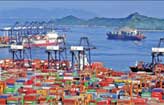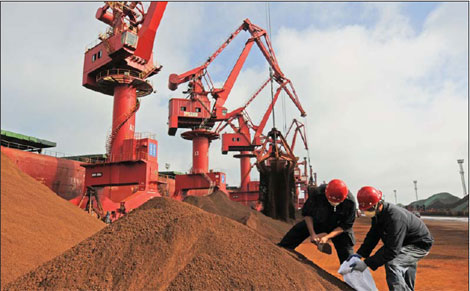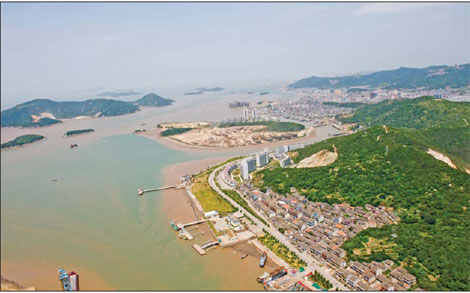Blue economy gets a lift
Updated: 2011-08-19 14:29
(China Daily European Weekly)
Shandong had in the 1990s itself realized the importance of marine resources in its economic growth and chalked out a plan to base its development on the sector.
"Our national economic plan used to focus largely on the development of land resources," says Fei Yunliang, head of the construction office for the Shandong Peninsula Blue Economic Zone, after the zone got government approval in January this year.
"The zone is part of China's first national marine strategy and sets the new trend for economic development," Fei says.
The economic zone covers all the offshore waters in Shandong province with an area of 159,500 sq km. It also covers 64,000 sq km of land that includes six cities - Qingdao, Dongying, Yantai, Weifang, Weihai and Rizhao - and two coastal counties in Shandong.
According to Fei, Shandong is aiming to build its primary marine industries such as ocean farming, secondary industries such as marine equipment manufacturing and new energy, and tertiary industries such as tourism.
Cheng Shenbao, president, Qingdao Electronics and Information School, is one of the entrepreneurs in Shandong who is watching the sector closely. Buoyed by the new zone, Cheng plans to launch ocean-related programs in his school soon.
"The founding of the Shandong Peninsula Blue Economic Zone offers a good opportunity for us to update the school courses and renew our school's development strategy," Cheng says.
Equipping students with aquaculture skills will be a dramatic change for Cheng's school, which has decades of history of nurturing skilled workers in the mechanical electronic industry.
Shandong peninsula, with a coastline of more than 3,000 km, ranks the second in China by the turnover of its marine sector. The marine related industry generated 604 billion yuan in 2009, and contributed nearly 18 percent to Shandong's GDP.
|
|
Apart from the edges brought by nature, Shandong also has some other advantages that will allow the province to take the lead in the blue economic wave.
The province is home to 40 percent of China's marine scientists. More than half of the national oceanic scientific research programs and many ocean research institutions are located in Qingdao, a coastal city in East China's Shandong province that also hosted the 2008 Olympic sailing events.
"We will utilize our scientific research advantage to the hilt," Xia Geng, mayor of Qingdao, said in a recent interview.
However, the number of elite ocean experts who master cutting-edge technologies are sparse in China.
By current counts, fewer than 100 Chinese scholars can be tracked on the world's ocean expert database. The number is lower than 1 percent of the global total, and accounts for just 5 percent of the experts in the United States, according to statistics from the Ministry of Human Resources and Social Security of China.
It is not that Shandong is not aware of these shortcomings. Qingdao, which has the most talents in the marine sector in China, has turned to the overseas market, to build itself as the silicon valley of China's marine economy.
The Qingdao Foreign Experts Bureau has managed to get 30 experts from abroad to work in the city. "Our ocean experts are keen to work for research organizations, as only few of them are able to transfer their academic achievement into business ventures," Yao Jihua, head of the bureau, says.
"All the 30 experts from overseas are in Qingdao not only with their subject knowledge but also with projects, which can turn into products very soon," he says, adding his bureau will continue making efforts to invite top-notch experts to work in the city.
Zhejiang province
Zhoushan, a city in coastal Zhejiang province is the fourth development area in China after Shanghai Pudong, Tianjin Binhai New Area and Liangjiang New Area in Chongqing but the first State-level development area that is oriented toward the marine economy.
"It is a national-level strategy, which will surely get a lot of attention, either from the policymakers or investors. There is no doubt that the development of Zhoushan will be on the fast track," says Chen Jianming, chairman of Shanghai Sansheng Hongye Investment Group and a native of the city.
The Zhoushan Archipelago New Area is a major initiative of the central government in advancing the overall strategy of marine development and a key step in fulfilling the objectives of the 12th Five-Year Plan, says Fan Hengshan, a senior official with the National Development and Reform Commission.
|
|
The State Council approved the establishment of the new area on June 30. It "indicates that the pilot projects of the marine economy are now in the implementation phase", Fan says.
The new zone will be transformed into a place for international transportation and processing and trade of commodities and also serve as a gateway for East China to interact with the world.
As the only prefecture-level city consisting solely of islands in China, Zhoushan is believed to have the most potential in Zhejiang to further develop the province's marine sector.
Despite Zhejiang being one of the smallest provinces in China, its ocean area is nearly 2.6 times the land area. Its coastline, spread over 6,700 km, ranks the first in China.
Nearly 40 percent of China's 6,536 offshore islands are located in Zhejiang with 1,400 of them in the Zhoushan Archipelago New Area.
"The vast number of offshore islands in Zhoushan provides strong impetus for the development of the marine sector," says Fu Jinlong, deputy director with Zhejiang Development Planning and Research Institute.
The islands in Zhoushan will be developed in accordance with their characteristics for various activities like marine tourism, advanced manufacturing and clean energy, Fu says.
"Zhejiang is famous for its vibrant business climate and is home to a large number of successful entrepreneurs. This will help the region make significant strides in marine economy," he says.
Zhejiang is clearly aware of these advantages and has invited a group of successful businessmen from Zhoushan to visit the city in early August, with an eye on investments.
"We Zhoushan businessmen have a tradition of returning the favor to our hometown after we reach a certain level of achievement," Chen says.
"I've decided to invest 700 million yuan in a five-star hotel," Chen says.
As the leader of the Zhoushan Chamber of Commerce in Shanghai, he plans to invest 10 billion yuan in Zhoushan, along with fellow Zhoushan entrepreneurs from Shanghai.
Guangdong province
The southern Guangdong province got the central government's nod to become the third marine economic development zone in late July.
But the province has already charted an ambitious plan to take its marine economy to 1.5 trillion yuan by 2015, and account for a quarter of the GDP by then.
Guangdong's marine output has topped all the provinces in China for 16 years in a row, and was worth 829.1 billion yuan in 2010, contributing 18.2 percent of its GDP.
There is no detailed plan about how the region plans to achieve its goal. But experts agree that the energy resources in deeper and broader water offshore of Guangdong are an inherent advantage that cannot be ignored.
Guangdong province has the edge in offshore exploration of oil and gas, especially the exploration of the South China Sea, Han says.
Zheng Tianxiang, a professor at the Hong Kong and Macao Research Institute of the Sun Yat-sen University, agrees with Han, saying Guangdong could also get strong financial support from the government.
China is heavily dependent on energy and other resources to fuel its rapid economic growth. To ensure the sustainability of energy resources, the country is searching intensively for offshore sources to reduce dependence on foreign imports.
"China has a great need for new sources of energy and minerals, which the continental shelf and seabed of the ocean can supply. This can be seen in recent disputes with neighboring countries," says O'Toole.
China National Offshore Oil Corporation (CNOOC), the biggest offshore oil and gas producer in China, plans to invest 350 billion yuan over the next five years to explore domestic oil and natural gas resources. Of this it will spend 20 billion yuan for deepwater exploration of oil and gas, says a recent company statement.
"We will continue to focus on the South China Sea (exploration) in the foreseeable future," CNOOC Chief Executive Yang Hua said while outlining the company's business strategy earlier this year.
"The value of the South China Sea natural resources is immense. Now that technologies are available for China to tap these resources, efforts must be made to guard them zealously," says Zhao Ying, a scholar with the Chinese Academy of Social Sciences.
Zhao Ruixue contributed to this story.
E-paper

Blue economy gets a lift
Coastal areas of Shandong, Zhejiang and Guangdong to spearhead sector development.
The light touch
Long way to go
Outdoor success
Specials

Star journalist remembered
Friends, colleagues attended a memorial service to pay tribute to veteran reporter Li Xing in US.

Robots seen as employer-friendly
Robots are not new to industrial manufacturing. They have been in use since the 1960s.

A prosperous future
Wedding website hopes to lure chinese couples


